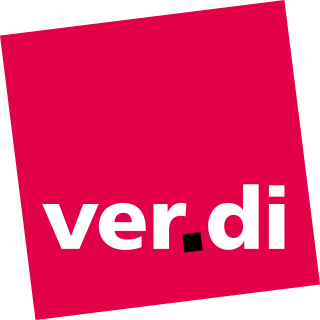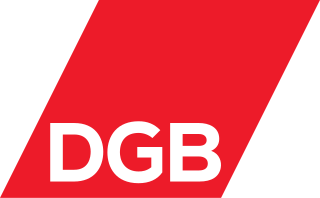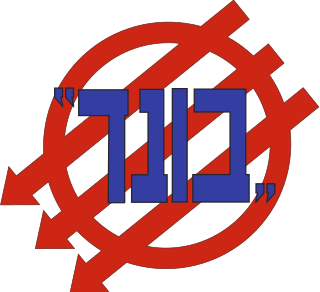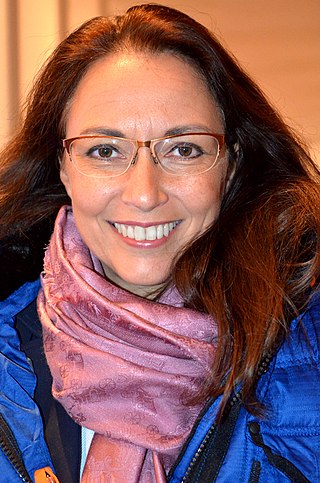
The Free German Trade Union Federation was the sole national trade union centre of the German Democratic Republic which existed from 1946 to 1990. As a mass organisation of the GDR, nominally representing all workers, the FDGB was a constituent member of the National Front. The leaders of the FDGB were also senior members of the ruling Socialist Unity Party of Germany (SED).
In the fourteen years the Weimar Republic was in existence, some forty parties were represented in the Reichstag. This fragmentation of political power was in part due to the use of a peculiar proportional representation electoral system that encouraged regional or small special interest parties and in part due to the many challenges facing the nascent German democracy in this period.

Vereinte Dienstleistungsgewerkschaft is a German trade union based in Berlin, Germany. It was established on 19 March 2001 as the result of a merger of five individual unions and is a member of the German Trade Union Confederation (DGB). With around 1.9 million members, Verdi is the second largest German trade union after IG Metall. It currently employs around 3000 members of staff in Germany and has an annual income of approximately 454 million Euros obtained from membership subscriptions. The trade union is divided into 10 federal state districts and five divisions and is managed by a National Executive Board (Bundesvorstand) with nine members. Frank Bsirske was the chairman of Verdi from its founding in 2001 until September 2019, when Frank Werneke was elected.
SOLIDAR is a European network of NGOs working to advance social justice in Europe and worldwide. SOLIDAR voices the concerns of its member organisations to the EU and international institutions across the policy sectors of social affairs, international cooperation, and lifelong learning.

The German Trade Union Confederation is an umbrella organisation for eight German trade unions, in total representing more than 6 million people. It was founded in Munich, 12 October 1949.

The German Salaried Employees' Union, in German Deutsche Angestellten-Gewerkschaft (DAG) was an independent trade union based in Hamburg. It did not belong to the German Confederation of Trade Unions until it became part of ver.di, the united trade union for the services industry, in 2001.

The IG Bauen-Agrar-Umwelt is a trade union in Germany with a membership of 350,000. It is the fourth largest of eight industrial affiliates of the DGB. IG BAU is active in the sectors of construction and engineering, building materials, building cleaning, facility management, gardening, forestry and agriculture. Since 2013 Robert Feiger has been the president of IG BAU.

The Gewerkschaft der Polizei is a trade union in Germany. It represents 181,000 police employees, and is one of eight industrial affiliations of the German Confederation of Trade Unions (DGB). The GdP is one of the three trade unions for police employees in Germany, the other two being the Deutsche Polizeigewerkschaft - affiliated with the German Civil Service Federation - and the Bund Deutscher Kriminalbeamter, which is exclusively for members of the Kriminalpolizei.
Trade unions in Germany have a history reaching back to the German revolution in 1848, and still play an important role in the German economy and society.

The International Trade Union Confederation (ITUC) is the world's largest trade union federation.
The Global Labour University (GLU) is an international network of universities, trade unions, NGOs and the International Labour Organisation. It was initiated in 2002 and offers master's programs, academic certificate programs and Massive Open Online Courses (MOOC) on sustainable development, social justice, international labour standards and trade/labour unions, economic policies and global institutions.
Zentralgewerkschaftskommission des Deutschen Gewerkschaftsbundes in der Tschechoslowakischen Republik was a German Social Democratic trade union centre in Czechoslovakia. From 1927 onwards, it was an autonomous structure inside the Czechoslovak labour centre OSČ. The organization was dissolved as Czechoslovakia fell under German occupation.

Ursula Engelen-Kefer is a German politician who held the position of Deputy Chairman of the German Confederation of Trade Unions from 1990 to 2006. She is currently a lecturer at the German Federal Employment Agency’s special training school Hochschule der Bundesagentur für Arbeit in Schwerin. She also teaches at the Free University of Berlin and chairs the Social Policy Working Group of the non-government organization Sozialverband Deutschland. From 1986 to 2009, Ursula Engelen-Kefer belonged to the 45-member „Executive Committee“ of the Social Democratic Party (SPD). She was chosen by the district of Ingolstadt, Eichstätt and Neuburg-Schrobenhausen to be its direct SPD candidate for the Bundestag in the last federal election. In July 2009 she was elected as a member of the "Executive Committee" of the Social Democratic Party in Bavaria.

The General Jewish Labour Bund in Poland was a Jewish socialist party in Poland which promoted the political, cultural and social autonomy of Jewish workers, sought to combat antisemitism and was generally opposed to Zionism.
The General German Trade Union Federation was a confederation of German trade unions in Germany founded during the Weimar Republic. It was founded in 1919 and was initially powerful enough to organize a general strike in 1920 against a right-wing coup d'état. After the 1929 Wall Street crash, the ensuing global financial crisis caused widespread unemployment. The ADGB suffered a dramatic loss of membership, both from unemployment and political squabbles. By the time the Nazis seized control of the government, the ADGB's leadership had distanced itself from the Social Democratic Party of Germany (SPD) and was openly cooperating with Nazis in an attempt to keep the organization alive. Nonetheless, on May 2, 1933, the SA and SS stormed the offices of the ADGB and its member trade unions, seized their assets and arrested their leaders, crushing the organization.
The General Commission of German Trade Unions was an umbrella body for German trade unions during the German Empire, from the end of the Anti-Socialist Laws in 1890 up to 1919. In 1919, a successor organisation was named the Allgemeiner Deutscher Gewerkschaftsbund, and then in 1949, the current Deutscher Gewerkschaftsbund was formed.

Yasmin Fahimi is a German trade unionist and politician who has been chairing the German Trade Union Confederation (DGB) since 2022.
A police union is a trade union for police officers. Police unions formed later than most other occupations, reflecting both a conservative tendency and relatively superior working conditions. The first police unions formed in the United States. Shortly after World War I, the rising cost of living, wage reductions, concerns over amount of rest and growing dissatisfaction among rank and file police officers led to a number of police strikes from 1918–1923 and the formation of police unions globally.









